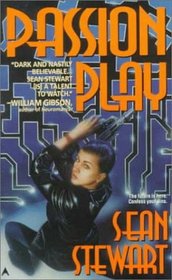To start, a passion play is "a dramatic presentation depicting the Passion of Jesus Christ: his trial, suffering, and death." (Thank you Wikipedia!) The title is thus a significant hint as to what sort of story this is; judging from the few reviews I've spotted online, not enough people got this going in.
That out of the way, this is an impressive first novel. Stewart's pacing is steady, his characters are well-drawn (if a bit stereotypical), and his prose is assured. The novel works equally well as science fiction, with its dystopic future and telepathic narrator, and as a mystery, with its cast of distinct suspects and very memorable dead man. It's lean and taut and packs a punch.
I actually wished it were a little less lean -- while I was content to simply wonder about how the Redemption Presidency came about, and why the police hired private contractors to do their detective work, and how they managed to get around that pesky first amendment right to freedom of religion, I really felt the novel needed a bit more of an infodump about the narrator's psychic abilities. They were central to the plot (whereas all the governmental stuff was mere backdrop) and I couldn't figure out a couple of key points (mostly whether or not anyone knew she was a shaper, and what the difference was between shapers and empaths) that would have changed how I read several scenes.
Despite that dissatisfaction, this is a powerful novel. Stewart has said "I wanted to write a book about moral choice. . . [to] create a society in which everyone cared passionately about moral choice." At the end I think I would quibble over whether there was a choice at all, but I didn't really care, because Stewart succeeded so well in capturing the tone of those sorts of moments, the agony of a crisis of faith and the relief in re-committing oneself, even in a pyrrhic fashion. Despite the SF world-building and mystery plot, this is an intimate novel, one that rises and falls with how well the reader responds to Diane's voice. The novel starts with the following:
"When I try to write it down, it dies: I find myself speaking with my father's polished, thoughtful voice. But what I want to do is shout until my heart cracks, shout like a preacher at a Redemption service. I want God to grant me a voice that will shatter these concrete walls like the ramparts of Jericho. I want to speak in tongues my damnation, make you all see that this isn't just about the murder of Jonathan Mask, but about law and God and justice.
Shit.
It's a dark time and we all sound like the Bible."
If that works for you, you will very likely love this novel. I did.
That out of the way, this is an impressive first novel. Stewart's pacing is steady, his characters are well-drawn (if a bit stereotypical), and his prose is assured. The novel works equally well as science fiction, with its dystopic future and telepathic narrator, and as a mystery, with its cast of distinct suspects and very memorable dead man. It's lean and taut and packs a punch.
I actually wished it were a little less lean -- while I was content to simply wonder about how the Redemption Presidency came about, and why the police hired private contractors to do their detective work, and how they managed to get around that pesky first amendment right to freedom of religion, I really felt the novel needed a bit more of an infodump about the narrator's psychic abilities. They were central to the plot (whereas all the governmental stuff was mere backdrop) and I couldn't figure out a couple of key points (mostly whether or not anyone knew she was a shaper, and what the difference was between shapers and empaths) that would have changed how I read several scenes.
Despite that dissatisfaction, this is a powerful novel. Stewart has said "I wanted to write a book about moral choice. . . [to] create a society in which everyone cared passionately about moral choice." At the end I think I would quibble over whether there was a choice at all, but I didn't really care, because Stewart succeeded so well in capturing the tone of those sorts of moments, the agony of a crisis of faith and the relief in re-committing oneself, even in a pyrrhic fashion. Despite the SF world-building and mystery plot, this is an intimate novel, one that rises and falls with how well the reader responds to Diane's voice. The novel starts with the following:
"When I try to write it down, it dies: I find myself speaking with my father's polished, thoughtful voice. But what I want to do is shout until my heart cracks, shout like a preacher at a Redemption service. I want God to grant me a voice that will shatter these concrete walls like the ramparts of Jericho. I want to speak in tongues my damnation, make you all see that this isn't just about the murder of Jonathan Mask, but about law and God and justice.
Shit.
It's a dark time and we all sound like the Bible."
If that works for you, you will very likely love this novel. I did.





